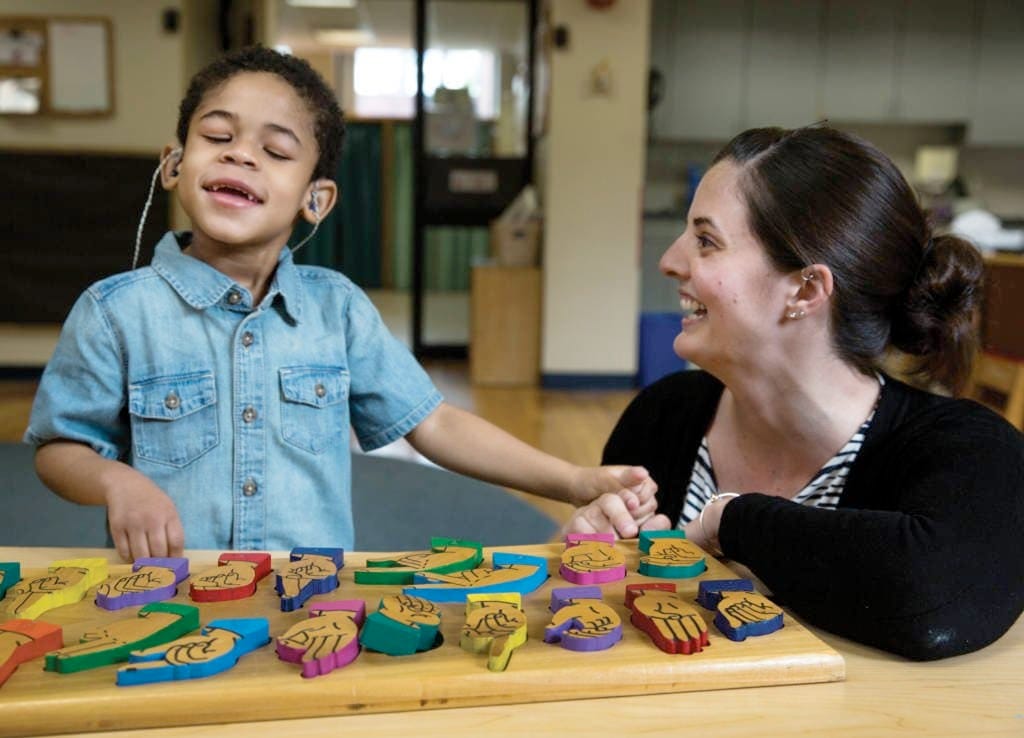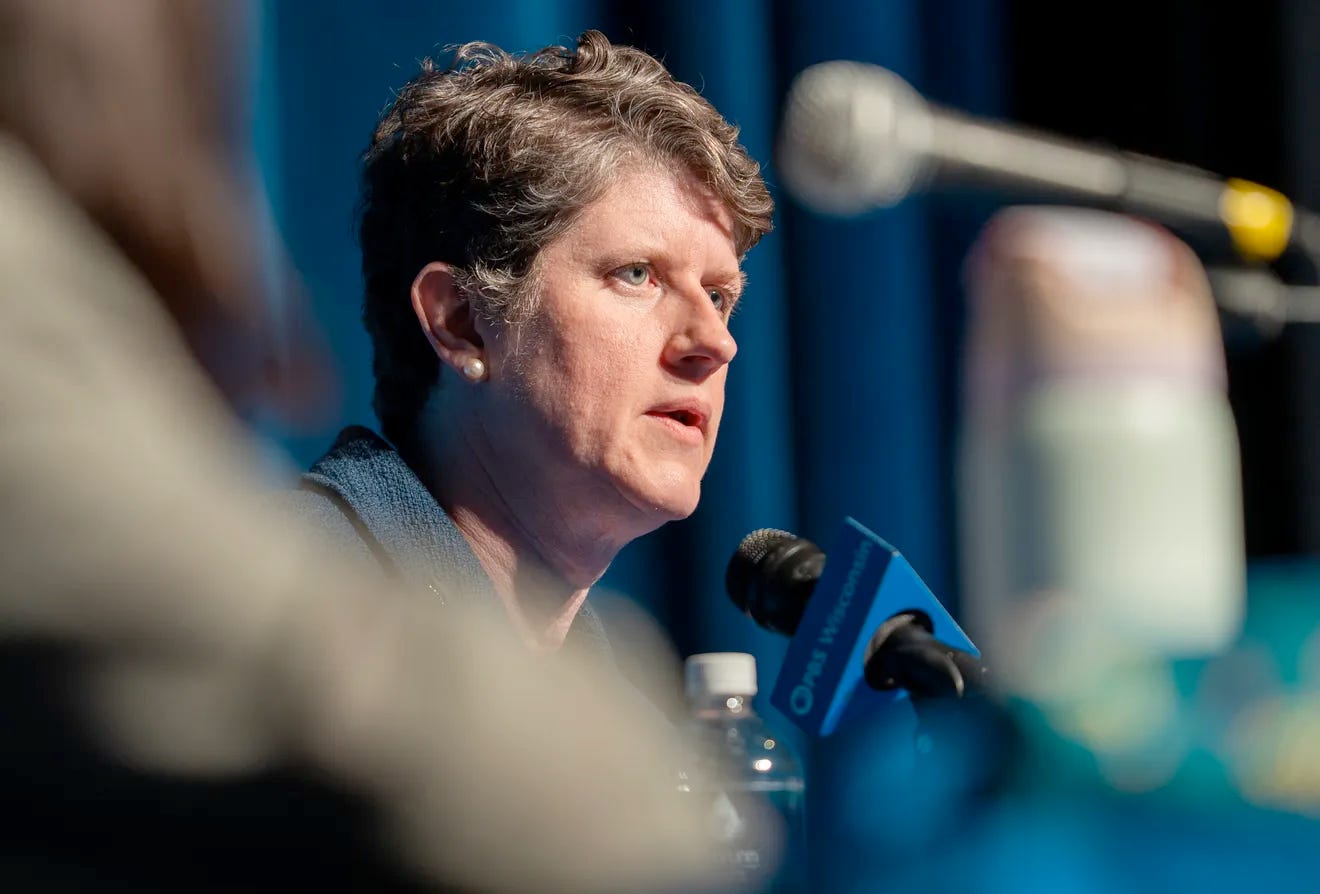The War on “Woke” Comes for Disabled Students
Education Department grants are being cut arbitrarily
Mark Dunning’s daughter was born unable to hear. “We spent nearly a decade learning how to cope with deafness, with the emotional impact of having your dreams, desires, wishes for your newborn child dramatically adjusted,” he said. But the family adapted, and by the time Mark’s daughter was eight, “our lives had simply grown over the wound of the diagnosis, like tree bark over a lightning strike.”
Then Mark’s daughter started to go blind.
She was diagnosed with Usher syndrome, a rare genetic condition that had caused her deafness and now was robbing her vision, too. Almost two decades later, “remembering the receipt of that diagnosis still brings me knee-buckling pain,” Mark said. “I have never felt such hopelessness.”
Around that time — “when we were at our lowest” — Mark’s family found the New England Consortium on Deafblindness. The group, according to its website, is a group of “consultants” and “state and regional partners” in Connecticut, Maine, Massachusetts, New Hampshire, and Vermont. They assist in diagnosing conditions that combine hearing and vision loss, refer deafblind children and their families to service providers and schools for children with special needs, and train educators on how to instruct deafblind children using things like tactile sign language.
The consortium, according to Mark, provided “confidence that our daughter would get an education, that she would get a job, that she would be able to support herself.” And so it was: Mark’s daughter is now 26. She has a degree in biology, an apartment of her own, friends, a career. Mark even says the New England consortium “saved my family.” But now the group is itself at risk because critical funding has been cut, seemingly arbitrarily, by the federal government.
Deafblindness affects some 10,000 American kids today, and many of them — including those helped by the New England group — have benefited from Department of Education (ED) grants that provided funds for state or regional programs that help deafblind students. The grants were first established in the 1960s, when an outbreak of rubella among pregnant women caused as many as 20,000 children to be born with deafblindness, and the funding continued uninterrupted until this fall. But as the new school year kicked off, the Trump administration cut grants for some of the organizations that make the education of deafblind children possible.
Programs in Oregon, Wisconsin, Maryland, and Washington state, as well as the New England consortium, received letters from the ED letting them know that the government was cutting their grants. Program directors were shocked to receive only one month’s notice that their budgeted funds for the entire school year would not be coming, and that they had only one week to file an appeal.
According to the government, the programs violate the Trump administration’s new policies that ban diversity, equity, and inclusion (DEI). The government said the programs use “overt race preferences or perpetuate divisive concepts and stereotypes.” In a statement made to ProPublica, Education Department Press Secretary Savannah Newhouse said that grants were no longer going to be funded on “autopilot” and that they would be reviewed to make sure they complied with the government’s “focus on merit.”
But despite the government’s insistence that the programs are “inconsistent with the administration’s priorities,” none of the impacted groups specifically fund diversity or antiracism work. Instead, it appears that in its haste to end “woke” DEI programs, federal administrators relied on the presence of language that referenced DEI concepts in the organizations’ grant applications, even if the references were unrelated to specific funding plans of the grantee.
Lisa McConachie, director of the Oregon Deafblind Project, expected to receive over $130,000 on October 1 for this year’s programming. But instead of the funds, in late August she got a letter terminating the grant for this year and the two remaining years of a five-year grant cycle.
The letter said her group’s activities “conflict with the Department’s policy of prioritizing merit, fairness, and excellence in education.” This conclusion was based on the ED’s discovery that the grant application included language about minimizing systemic racism.
But that language was not related specifically to the funded programs of the grant and did not come from the Oregon Deafblind Project itself, but rather from its “fiscal agent,” Portland Public Schools. A fiscal agent is usually a larger organization that oversees the receipt and security of funds for a smaller program. Although the Oregon Deafblind Project serves students around the state, Portland Public Schools is the current fiscal agent, and Portland District materials were therefore included in the Deafblind Project’s grant application.
The Department of Education cancellation letter highlighted what it viewed as problematic language: that Portland Public Schools were “working to improve strategies, interventions, processes to address inequities, racism, bias, and system marginalization of… dis/ability groups.” And they wanted to remove “long-standing structural inequalities in our system… to remove barriers to teaching and learning [and] create a sense of belonging for everyone.”
According to McConachie, while these statements express the goals of Portland Public Schools, they are not connected to the programming of the Oregon Deafblind Project. As she explained to Oregon Public Broadcasting, the canceled funding, like the Deafblind Project itself, served all students with deafblind conditions, regardless of race or socioeconomic status. The grant never funded the kinds of DEI programs that the Trump administration usually points to as “divisive” or “woke.”
Moreover, the programs originally applied for funding under the Biden administration, when statements addressing the inclusivity of the grant administrators were required. The government changed the rules in the middle of the game and, according to McConachie, cut the funding without providing the grant applicants an opportunity to revise their applications.
“It’s so heartbreaking,” said Audra Lydon, whose daughter Aingelise is in the program. “Our kids already fall through the cracks.” The Oregon project taught Audra how to communicate with her daughter and provided “community with other families” that had a deafblind child. Now they may have to watch that community vanish.
McConachie’s is not the only program stumped by the federal government’s apparent misunderstanding of what it was doing.
The parent organization of the Wisconsin Deafblind Technical Assistance Project also received a cancellation letter focused not on the services it provided, but on the group’s goals for recruiting special education teachers from historically marginalized groups and contracting with businesses owned by women, members of minority groups, and disabled veterans.
Adrian Klenz, a member of the group’s advisory board, said in addition that state officials told him two words in the grant proposal were flagged by the administration: transition and privilege. The word transition often emerges in discussion of student gender transitions and privilege is often a stand-in for the phrase white privilege. But in this case the use of the terms was different: the application said that funding was important because the kids were “transitioning from youth to adulthood.” And privilege came from a parent testimonial about the project’s staff — as in, “It was a privilege to work with them.”
In Wisconsin as in Oregon, the cuts are already being felt. Sid Miller, a former deafblind student, said the Wisconsin Deafblind Technical Assistance Project was a life line: “It’s so easy to be bumped aside, left sunken down in a corner. That’s where I would be if I didn’t have [the project] and all the great people I’ve met in my life.”
After completing the program, he went on to mentor deafblind youth as one of its contract workers, specializing in the use of 3D-printed objects to help the students practice Braille. But his position has been cut, and his students no longer benefit from his teaching: without the federal funding, the Wisconsin project had to terminate his contract as of September 30.
The funding cuts will impact specialized training and recruiting of new special education teachers as well. Jill Underly, Wisconsin’s superintendent of schools, warned that “losing these funds will directly impact our ability to serve some of our most vulnerable kids.” She added that “these are kids who depend on specialized support just to access their guaranteed right to a free and appropriate public education.”
In general, federal grant writing and grant administration has been fraught in 2025 as nonprofits react to new requirements and priorities of the Trump administration. In March, The New York Times reviewed internal memos and documents from several agencies and compiled a list of 197 trigger words that could potentially get a grant flagged or canceled, no matter the context. Sense of belonging, underserved, and disability all appear on the list.
One grant-writing coach suggests that nonprofits use synonyms for words on the banned list — impairments instead of disabilities, for example, to avoid government attention. Other grant consultants have developed slightly more nuanced suggestions that reframe the goals of a project to more closely parrot the goals of the administration. For example, instead of including kids with disabilities, maybe the project is supporting the individual needs of learners.
How successful these strategies will be at moving a project out of the administration’s DEI crosshairs is unclear, but nonprofits and the communities they serve should be able to trust that government administrators will give their applicants a real review before backing out of funding. Instead, it appears as though they are hitting Ctrl+F, typing a term, taking a glance at a highlighted word, and moving the program into the canceled column, no matter how beneficial it was to the community it served.
The deafblind programs in affected areas are appealing the cancellation decisions directly to the Department of Education, and the program directors hope that the government will reconsider. If not, McConachie told Oregon Public Broadcasting, it would mean “the end of the program.”
For families like Mark’s, the end of these programs would be a tragedy. His daughter owes her “normal, happy life, the one we thought she’d lost when she was diagnosed with Usher syndrome,” in part to deafblind projects.
These students are rural and urban; they are rich and poor; they are white and brown and Black. And they all deserve to learn, without being used as pawns in the war on “woke.” By zooming in on language in these grant applications instead of looking at the whole picture of the services and programs the grants fund, the government, ironically, has turned its back on the “excellence in education” it’s insisting it seeks.












As a public educator, school leader, and human being, it’s so hard for me to come to terms with how lost we are right now. Some days I believe we can overcome it and find our way out because I see the brave people tirelessly showing up and standing up. Other days, when I read pieces like this, the seeds of arbitrary cruelty burrow deep into my soul and take root like common weeds that come back over and over no matter how many times they get pulled.
If a Presidential administration can cancel any contract or grant that was done by a previous administration, then no one can rely on any contract or grant with the federal government that lasts longer than 4 years. Which is the point Russ Vought and the rest of the Trump admin are making to the people of the US, and to the world. Don't rely on the US govt to do anything for you that extends past the current admin. Contracts are worthless. We are not trustworthy. We do not honor our commitments. It's a terrible message that will have repercussions for decades.